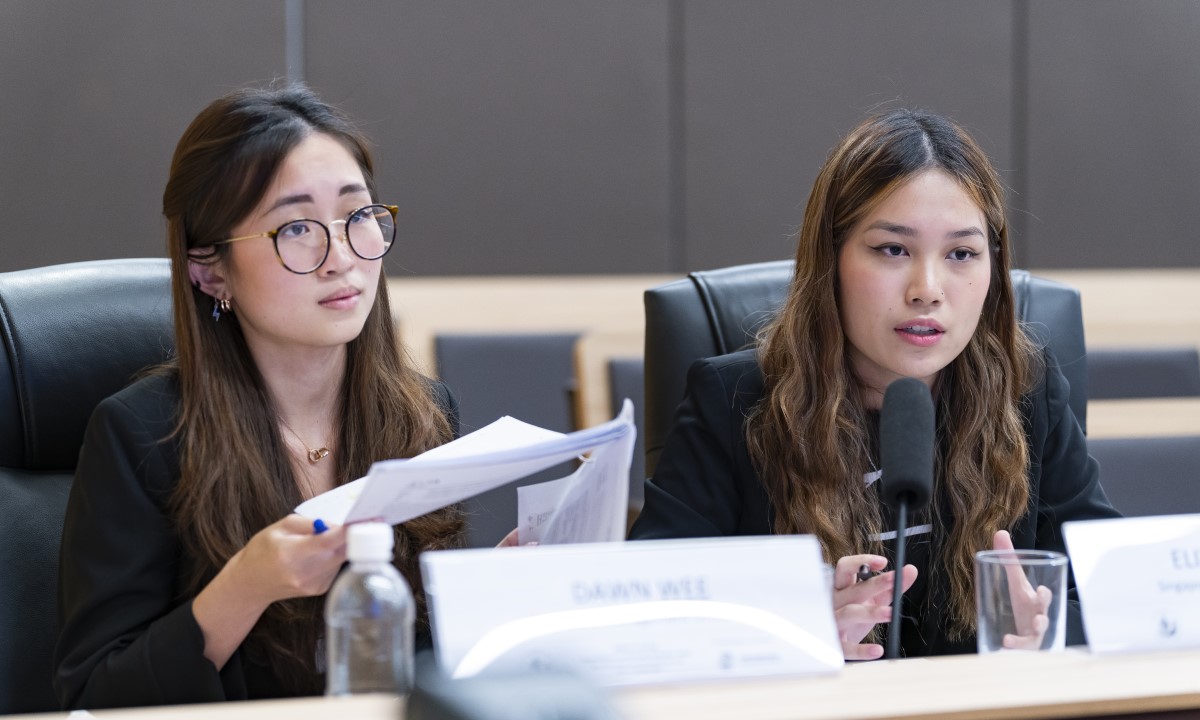Why moots remain an essential component of modern law education

A simulated legal argument conducted before a panel of judges, the moot court is an important part of any law student's education, and remains relevant in the modern legal practice.
Moots provide students with the opportunity to learn how to brief a case, think on their feet, and make effective oral arguments. Moreover, they play a pivotal role in grooming legal talents that can contribute to Singapore’s status as a leading dispute resolution hub.
"The demands of modern legal practice are such that the young law graduate is expected to be as practice-prepared as possible right off the bat," writes SMU Associate Professor of Law Chen Siyuan, in his paper, "International moots and the demands of modern legal practice: relooking the role of firms".
"[It arms students with abilities] to analyse, research, draft, write, advise, and even advocate on complex issues that do not always present clear demarcations in doctrines, jurisdictions, and cultures – and this is without mentioning other important soft skills required to thrive in practice."
The Frankfurt Investment Arbitration Moot is a leading moot competition in its class internationally, with a record turnout of more than 100 teams this year. SMU won the championship in 2017 and reached the championship final in its debut in 2015. It has also been placed 2nd runner-up in 2019. This year, the SMU Yong Pung How School of Law (YPHSL) team emerged champions after eight intensive matches in the competition’s 14th edition, held between 28 February and 4 March 2022.
The close synergy between the University and law firms WongPartnership and Providence Law Asia is a major contributing factor to team's success. Besides providing much-needed financial coaching support, the firms also put in substantial time commitments to coach the students and help them meet the rigours of the modern-day moots landscape.
"Law firms and universities work even closer together in ensuring that the craft of advocacy is effectively transmitted across generations from an early stage," notes Associate Professor Chen.
"This experience is invaluable for students, as it allows them to develop their oral advocacy skills and gain practical experience in a courtroom setting."
SMU has consistently been placed in the top three at the biggest and most prestigious international moot competitions, ranging from the Jessup and Vis to Price and Frankfurt. Its rigorous International Moots Programme offers students a chance to put theory into practice and to marshal various complex areas of law into coherent threads.
During the recent Frankfurt Investment Arbitration Moot, legal firms played a pivotal role in the mentorship of SMU mooters. WongPartnership focused more on the upper-year students, while Providence on the lower-year participants.
“Many of our mooters are trained over several years, taking part in smaller-scale regional competitions in their lower-years before advancing to the large international competitions in their upper-years,” explains Professor Chen.
Lawyers from the firms contribute by coaching ‑ from deciding on speaker selection to strategising; judging practice sessions and providing feedback; and providing general mentorship through activities such as networking lunches where they share career guidance tips and more.
After all, international mooting is an excellent way for students to network with peers, lawyers and legal professionals from around the world. Moots also teach students how to think on their feet, and how to structure and deliver a legal argument. In addition, mooting teaches students the importance of research and preparation, and helps to develop their legal analysis skills.
Daniel Liu, SMU Bachelor of Laws (LLB) alumnus, was a coach for the Frankfurt Moot. Now a partner at WongPartnership, the Law Valedictorian of the 2013 LLB class also won the Asia Cup 2011 and captained the Jessup 2013 team to the championship final.
“Daniel has been coach of the SMU Frankfurt team since 2015, so he has acquired great experience that is necessary to succeed in moot competitions, such as knowing what the judges are like, the questions they ask, the arguments make sense for an esoteric subject like investment arbitration law, and so forth,” shares Professor Chen.
“He was also a very successful mooter when he was a student so our students were confident in his leadership. With his contacts, the team was able to go through a number of practice sessions with a variety of lawyers from different backgrounds to sharpen their arguments.”
Another example of WongPartnership’s involvement was at the YPHSL win at the Vis East Moot, held between 27 March and 3 April 2022. The sister competition to the Willem C. Vis International Commercial Arbitration Moot in Vienna, the competition was initially established to provide law students, academics, and professionals based in Asia with a similar exposure to international arbitration and trade law as the Vis Moot in Vienna.
Meanwhile, Providence helped in with judging practice rounds for the Jessup, where SMU emerged second in world’s most prestigious moot court competition.
Now that moots can take place in-person with the easing of pandemic travel restrictions, SMU law students have more opportunities to hone their skills on the world stage.
As WongPartnership Associate Suryanarayanan Jayakumar, who was a coach for the Vis East Moot competition said, “I am proud of every member of the team and grateful for the privilege to work with them. Everyone was motivating one another and found ways to help each other. That is how we should all operate when it comes to practice - you will make everyone's lives easier if you can all take care of yourselves and the people around you. That is why there is strength in unity.


